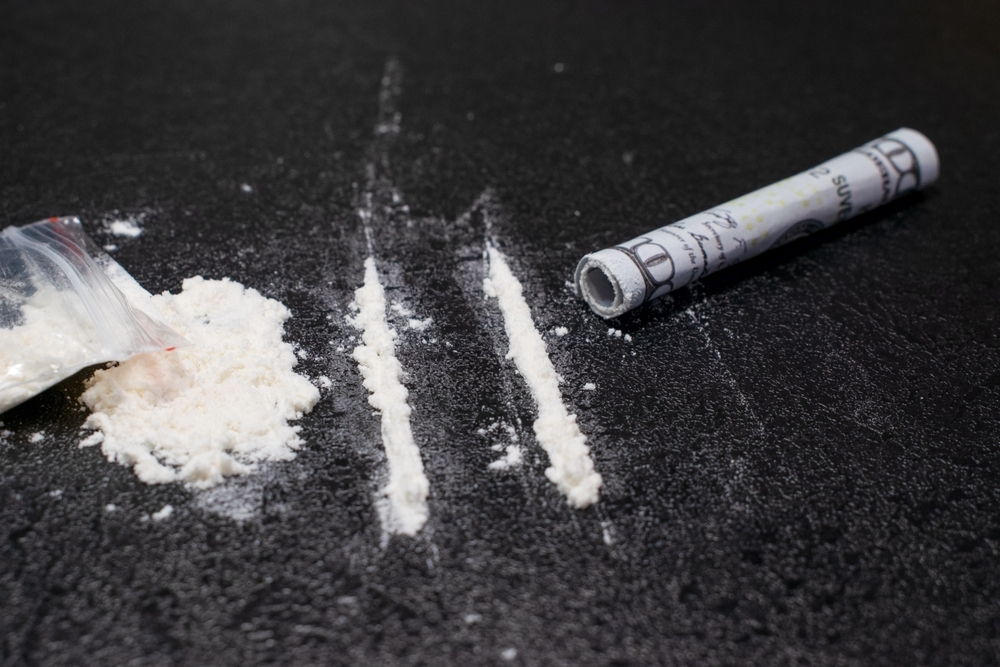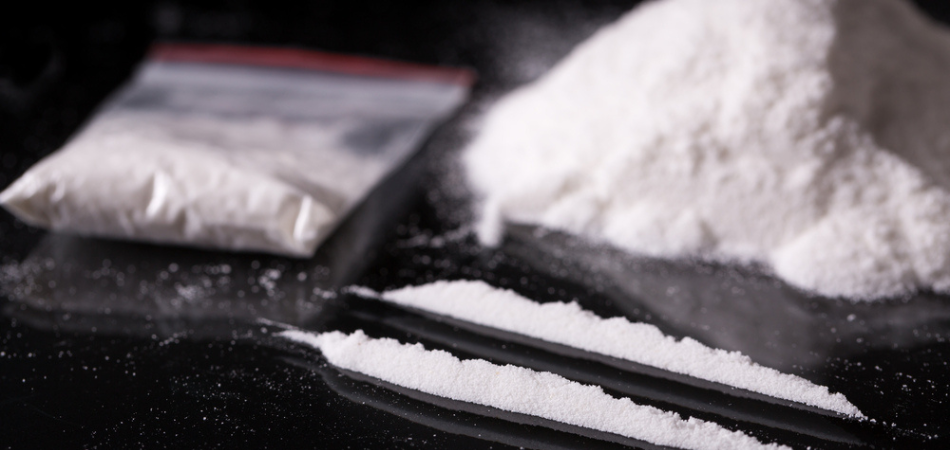
Written by:

Medically Reviewed by:
Last Updated:
June 4th, 2025
Cocaine Addiction | Signs, Symptoms & Effects
Cocaine addiction is a powerful and often destructive struggle that affects individuals in profound ways. It can take hold swiftly, altering both physical and mental health and deeply impacting relationships, careers, and daily life. Those grappling with cocaine addiction face numerous challenges, from cravings and dependency to the emotional toll it takes. Understanding cocaine addiction is crucial for those seeking help, as recovery requires more than just overcoming the physical dependency; it’s also about healing the mind and body.
What is Cocaine?
Cocaine is a potent central nervous system stimulant derived from the coca plant. It is most commonly found in the form of a white powder or as crack cocaine, a crystallised form that is smoked. As a stimulant, cocaine increases energy, confidence, and alertness by speeding up activity in the central nervous system. However, its effects are short-lived, often lasting only minutes, which can drive repeated use. Despite its history of medical use as an anaesthetic, cocaine is now widely recognised for its high potential for abuse and severe health risks.
What is Cocaine Addiction?
Cocaine addiction, also known as cocaine use disorder, is a chronic and relapsing condition where an individual develops a compulsive need to use the drug despite harmful consequences. Over time, repeated cocaine use alters the brain’s rewards system, making it increasingly difficult for a person to feel pleasure without the drug. This leads to intense cravings, loss of control over use, and continued consumption even when it causes financial, social, and health-related problems. Addiction to cocaine can also result in severe withdrawal symptoms when not using the drug, reinforcing the cycle of dependence.
What Makes Cocaine Addictive?
Cocaine is highly addictive due to its rapid and intense effects on the brain’s dopamine system. When taken, it locks the reabsorption of dopamine, leading to a buildup of this “feel-good” neurotransmitter, which creates a euphoric feeling. However, as the drug wears off, dopamine levels drop sharply, causing a crash that leaves users feeling exhausted, anxious, and depressed. This cycle of extreme highs and lows drives people to take more cocaine to regain the pleasurable sensations. Additionally, the more a person uses cocaine, the more their brain adapts, requiring larger amounts to achieve the same effects, ultimately increasing the risk of addiction.
Cocaine addiction in the UK
Cocaine addiction continues to be a significant public health issue in the United Kingdom, with recent data indicating a troubling rise in both usage and related fatalities. In 2023 to 2024, 19% of individuals entering substance misuse treatment reported problems with (non-crack) cocaine, reflecting an increase from previous years. This surge is most likely attributed to factors such as increased availability and higher purity levels of the drug.
The health consequences are severe, with cocaine-related deaths reaching an all-time high. In 2023, there were 1,118 deaths involving cocaine, marking a 30.5% increase from the previous year. This alarming trend underscores the urgent need for enhanced treatment services and public health interventions to address the escalating crisis.
Signs and Symptoms of Cocaine Addiction
Cocaine addiction can manifest in various physical, psychological, and behavioural ways, often becoming more severe over time. One of the most telling signs is the uncontrollable urge to use the drug despite its negative consequences. Users may find themselves unable to cut down or stop, even when they recognise the hard it is causing to their health, relationships, and more.
- Dilated pupils and heightened energy levels: Cocaine stimulates the nervous system, causing increased alertness, restlessness, and excessive talking.
- Frequent nosebleeds and runny nose: Snorting cocaine can damage the nasal passages, leading to chronic nosebleeds, inflammation, and even a collapsed septum with prolonged use.
- Loss of appetite and weight loss: Cocaine suppresses hunger, often resulting in malnutrition and noticeable weight loss over time.
- Heart issues: Increased heart rate, high blood pressure, and irregular heartbeat are common, putting users at higher risk of heart attacks and strokes.
- Insomnia and exhaustion: Many users experience sleeplessness and stay awake for long periods while using, followed by extreme fatigue and prolonged sleeping after a binge.
- Twitching or muscle spasms: Cocaine overstimulates the nervous system, which can lead to involuntary movements or muscle tics.
- Intense mood swings: Users may feel extreme euphoria when high, followed by deep depression and irritability as the drug wears off.
- Paranoia and anxiety: Cocaine can cause heightened nervousness, paranoia, and even hallucinations, making users feel as if they are being watched or in danger.
- Depression and suicidal thoughts: Long-term use depletes the brain’s ability to produce dopamine naturally, often leading to feelings of emptiness, sadness, and despair when not using the drug.
- Impaired judgement and impulsive behaviour: Cocaine can make users act recklessly, leading to dangerous decisions, risky sexual behaviour, or criminal activity.
- Obsessive thoughts and cravings: Individuals addicted to cocaine often think about the drug constantly, planning their next use and struggling to focus on anything else.
- Secretive or deceptive behaviour: Users may lie about their whereabouts, hide cocaine use, or become defensive when questioned.
- Neglect of responsibilities: Work performance, relationships, and personal hygiene may decline as cocaine becomes the primary focus of life.
- Financial problems: Cocaine is an expensive habit, leading many users to spend large sums of money, go into debt, or even steal to fund their addiction.
- Social withdrawal: People addicted to cocaine may distance themselves from family and friends, preferring the company of fellow users or isolating themselves altogether.
- Binge use patterns: Some individuals engage in cocaine binges, using large amounts in a short period, often leading to severe crashes afterward.
Cocaine addictions impact on mental health
Cocaine addiction has profound and far-reaching effects on mental health, exacerbating existing conditions and often leading to new psychiatric disorders. The stimulant properties of cocaine disrupt the brain’s natural chemistry, particularly by increasing dopamine levels, which play a key role in the brain’s reward and pleasure system. While this initially creates intense feelings of euphoria and confidence, prolonged use leads to significant mental health deterioration.
The Threat of Cocaine Overdose
Cocaine overdose is a serious and potentially fatal medical emergency that occurs when a person consumes a toxic amount of cocaine, overwhelming the body’s ability to process and metabolise the drug. The risk of overdose increases with higher doses, more frequent use, or when cocaine is combined with other substances, such as alcohol or opioids. Understanding the signs, causes, and consequences of a cocaine overdose is essential for prevention and timely intervention.
How Cocaine Overdoses Occur
Cocaine works by stimulating the central nervous system, increasing the levels of dopamine in the brain, which leads to heightened alertness, euphoria, and energy. However, excessive stimulation can lead to cardiovascular collapse, respiratory failure, seizures, and organ damage. Cocaine overdose occurs when the body’s systems become overwhelmed by the toxic effects of the drug. Since cocaine is often cut with other substances, such as fentanyl or amphetamines, users may not always be aware of the actual potency of what they are consuming, further increasing the risk of overdose.
Signs and Symptoms of Cocaine Overdose
Cocaine overdose can manifest in various ways, affecting both the physical and mental state of the individual. Symptoms can include:
- Cardiovascular Symptoms: Chest pain, irregular heart rate (arrhythmia), elevated blood pressure (hypertension), and stroke.
- Neurological Symptoms: Seizures, confusion, agitation, and loss of consciousness.
- Respiratory Symptoms: Difficulty breathing, rapid or shallow breathing, and respiratory failure.
- Behavioural Symptoms: Extreme paranoia, hallucinations, and aggression.
- Gastrointestinal Symptoms: Abdominal pain, nausea, and vomiting.
If left untreated, the overdose can lead to permanent organ damage or death due to the strain placed on the heart, brain, and other vital organs.
The risk of death
Cocaine overdose is a leading cause of drug-related fatalities, with death often resulting from complications such as cardiac arrest, stroke, respiratory failure, or seizures. The risk of death is heightened when cocaine is combined with other substances, as this can further overwhelm the body’s ability to manage the physiological stress caused by the drug. Given there is no antidote for cocaine overdose, immediate medical intervention is crucial to prevent life-threatening consequences.
Overcoming Cocaine Addiction
For individuals battling cocaine addiction, professional support is crucial in regaining control and achieving long-term recovery. A structured rehab programme provides the necessary guidance, coping strategies, and a supportive environment to help individuals navigate the challenges of overcoming addiction.
Here are some of the key components of rehab that can assist in overcoming cocaine addiction:
- Medically Managed Detox: Ensures a safe and comfortable withdrawal process, helping to manage the physical symptoms of cocaine detox.
- One-to-One Counselling: Focuses on addressing personal challenges, emotional triggers, and the underlying causes of addiction.
- Individualised Therapies: Approaches such as Cognitive Behavioural Therapy (CBT) and Dialectical Behaviour Therapy (DBT) are used to identify triggers and develop effective coping strategies.
- Holistic Therapies: Practises like yoga, meditation, and mindfulness promote overall well-being and emotional balance.
- Aftercare and Ongoing Support: Programmes like alumni networks, continued therapy, and support groups help maintain long-term sobriety.
At Linwood House, treatment for cocaine addiction goes beyond simply stopping drug use; it is focused on healing the whole person. The rehab experience is catered to ensure both the physical detox process and the psychological triggers that contribute to addiction are addressed.
Through a structured programme of therapy, counselling, and wellness activities, individuals are supported in exploring the root causes of their addiction, building healthier coping mechanisms, and restoring confidence. With expert medical care, mental health professionals, and a strong peer support network, those at Linwood House are empowered with the tools needed to achieve lasting recovery and regain control of their lives.
Take the First Step Towards Recovery
If you or someone you care about is struggling with cocaine addiction, you are not alone. At Linwood House, our experienced team offers the expert care, guidance, and support necessary to overcome cocaine addiction and create a healthier, drug-free future. Contact us today to discover more about our treatment programmes and how we can assist you in regaining control of your life.









